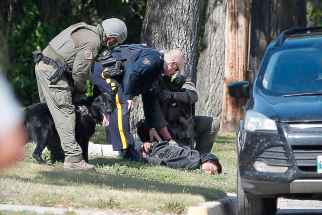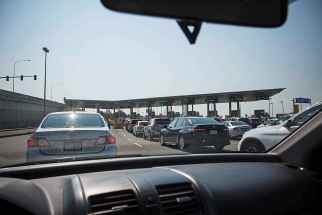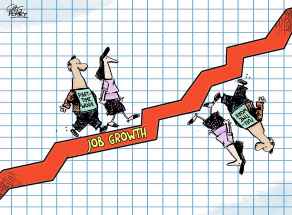Crossing the line Truth, injustice and – permanently blocking – the American way is what awaits Canadians who fess up to past cannabis use at the border
Read this article for free:
or
Already have an account? Log in here »
To continue reading, please subscribe:
Monthly Digital Subscription
$0 for the first 4 weeks*
- Enjoy unlimited reading on winnipegfreepress.com
- Read the E-Edition, our digital replica newspaper
- Access News Break, our award-winning app
- Play interactive puzzles
*No charge for 4 weeks then price increases to the regular rate of $19.00 plus GST every four weeks. Offer available to new and qualified returning subscribers only. Cancel any time.
Monthly Digital Subscription
$4.75/week*
- Enjoy unlimited reading on winnipegfreepress.com
- Read the E-Edition, our digital replica newspaper
- Access News Break, our award-winning app
- Play interactive puzzles
*Billed as $19 plus GST every four weeks. Cancel any time.
To continue reading, please subscribe:
Add Free Press access to your Brandon Sun subscription for only an additional
$1 for the first 4 weeks*
*Your next subscription payment will increase by $1.00 and you will be charged $16.99 plus GST for four weeks. After four weeks, your payment will increase to $23.99 plus GST every four weeks.
Read unlimited articles for free today:
or
Already have an account? Log in here »
Hey there, time traveller!
This article was published 30/08/2018 (2661 days ago), so information in it may no longer be current.
It was January 9, 2018, the start of a new year. As Blaine Graham pulled up to the U.S. border crossing at Sumas, Wash., he was ready to start a new phase in his life.
Graham was moving from Chilliwack, B.C. to Dallas, where he was about to start a new job as a regional sales manager for a technology company. He’d already spent months obtaining the visa that would allow him to work legally in the United States. Graham had sold his home in Chilliwack, rented an apartment in Dallas and moved almost all his worldly possessions down to Texas ahead of him.
At last, the 24 year old was ready to move his family across the border.
Graham pulled up to the checkpoint and gave a U.S. Customs and Border Protection officer his Canadian passport, the one with the precious work visa attached. That passport was about to expire, but Graham was prepared: he also had a brand-new Canadian passport, just in case. He handed that over, too.
The two passports were enough to give the officer pause, and he sent Graham to secondary inspection. There, another officer started asking about Graham’s work visa and his job.
Then the conversation took a turn that would change Graham’s life. From his current home in Saskatoon, Graham remembers the exchange.

"’Are you taking any prescription medication?’ ‘No.’ ‘Do you do any drugs?’ ‘No.’"
"’Have you ever used marijuana before?’ And then, I accidentally just said, ‘Yes, medically.’"
Graham was honest with the U.S. border officer. He has juvenile rheumatoid arthritis, and had been using cannabis a few times a week to ease the painful symptoms of the autoimmune disease. He did so on his doctor’s recommendation, but he’d never bothered signing up for Canada’s official medical cannabis program — in Chilliwack, it was easy enough to access cannabis by taking a doctor’s note to a local medical marijuana dispensary.
But the border officer only had more questions. He asked Graham whether he had ever used cocaine or ecstasy.
"I started getting a little stressed out, because I realized the nature of the conversation. At first I thought, I’ll just go to the border and be honest, and you’re not going to have an issue, right? I didn’t think I was committing any crimes."
About two hours after arriving at the U.S. border, Graham was searched and put in handcuffs as his wife waited with their 15-month-old baby.
Eventually, the officers sat Graham down to take a sworn statement. Now he was under oath.
The official transcript of the interrogation shows a volley of tough questions: Where did he buy marijuana? When he applied for his work visa, did he disclose that he was a regular narcotic user? Had he ever purchased marijuana in the United States? Had he ever grown it? Sold it? Did he understand that under U.S. and Canadian law, marijuana was a controlled substance? Did he understand that it was illegal to possess marijuana under both laws?
Finally, the officers released him back into Canada. He told them he’d return with a doctor’s note, to prove that he had a legitimate medical reason to use cannabis.
“It basically ruined a whole year of my career and cost me all my savings”
– Blaine Graham on telling U.S. border officers that he had used medical marijuana in Canada
Ten days later, he was back at the Sumas border crossing just south of Abbotsford, B.C. — this time without his family, but carrying a letter from his doctor and an official medical authorization to use cannabis for his arthritis. This time, the officers searched his phone before taking another sworn statement, and asked him yet more questions about his marijuana use.
"As soon as I admitted that I used marijuana at the age of 18, without a medical licence, then he said, ‘OK, perfect, we’re done, that’s all I needed.’"
The officers told Graham that he was inadmissible to the United States. Now, he’d need to apply for a special waiver to enter the country.
He’s still waiting for the document almost nine months later. He’s hired a lawyer, he’s stopped using cannabis for his arthritis and he even submitted to an examination and drug screening from a U.S. government-approved physician.
"It basically ruined a whole year of my career and cost me all my savings," says Graham, who adds he had "no idea whatsoever" that this could happen to him.
"And then as soon as it happened, I start Googling and I see hundreds of cases, and I’m like, ‘Oh my God, I just screwed myself for life.’ And I didn’t even realize it."
•••
Blaine Graham is far from the only Canadian who’s ever been banned from entering the United States for admitting to cannabis use, but the exact number remains a mystery.
Officials with Public Safety Canada said they couldn’t provide a figure, referring inquiries to the U.S. government. A spokeswoman for U.S. Customs and Border Protection said the agency doesn’t break down its inadmissibility statistics by cause, but provided data showing 14,166 Canadian citizens were found inadmissible at northern U.S. land border crossings in the agency’s 2017 fiscal year.

Graham’s lawyer is Len Saunders, who practises immigration law just minutes south of one of the busiest border crossings between Canada and the U.S., the Peace Arch in Blaine, Wash.
Not long ago, Saunders seldom dealt with cases of Canadians who were deemed inadmissible to the United States for cannabis-related reasons.
"I like to say, when I first started practising here 15 years ago I would see, like, one or two cases a year, honestly," he says. "They were rare."
But after Washington legalized non-medical marijuana in 2012, Saunders "started seeing one or two cases a month." Now he gets them on a weekly basis, which he attributes to U.S. border guards in Washington questioning more and more Canadian travellers.
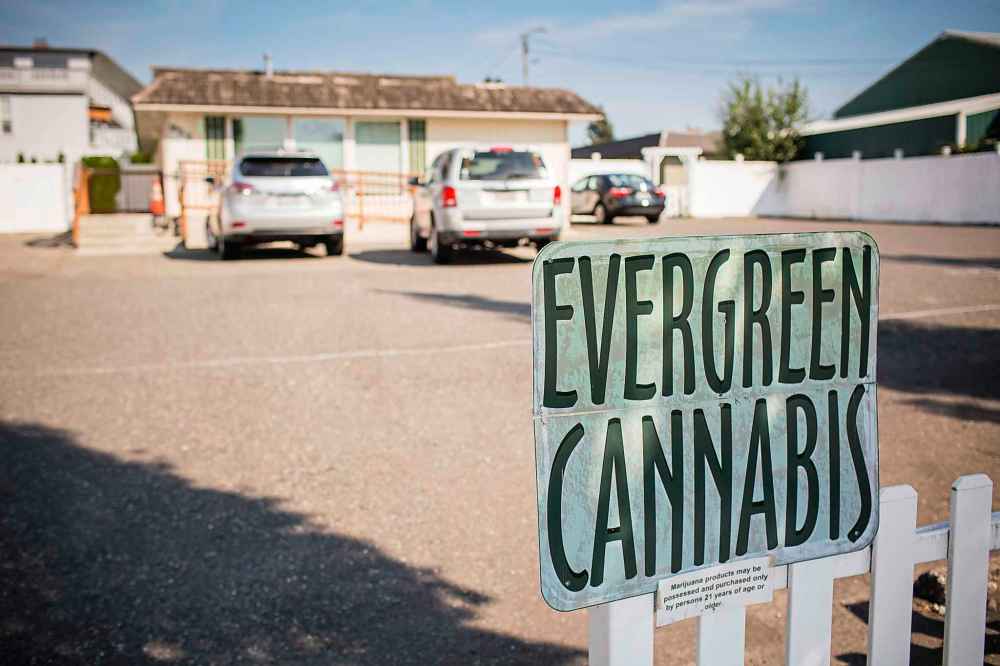
"Because the officers, on their way to work every day like me, drive by marijuana shops," he says. "And guess whose cars are in the parking lots? Canadians."
Saunders, a dual U.S.-Canadian citizen who was born and raised near Vancouver, has made himself the go-to expert for Canadian media on the topic of cannabis and the border. He estimates he’s done about 100 media interviews this year alone.
"I’m somewhat passionate when I see Canadians being screwed by U.S. immigration," he explains.
When asked about the Canadian government’s position on the issue, that passion shines through.
In June, CTV Power Play host Don Martin quizzed Public Safety Minister Ralph Goodale about the catch-22 that is cannabis at the border.
"The trouble is, if you tell the truth — if you’ve used marijuana in the past — they turn you back, and if you lie it’s against the law," Martin asked. "How on earth is a Canadian supposed to deal with this?"
"Lying to a border official on either side of the border, whether you’re an American or a Canadian, is a very serious offence," Goodale replied. "So everyone approaching the border on either side should tell the truth."
What can you do if you’re asked about marijuana at the U.S. border?
Canadians have the right not to answer questions asked by U.S. border officers when entering the United States, advises immigration attorney Len Saunders, although they’ll likely be denied entry to the country if they don’t co-operate.
“Sometimes Canadians are told at the port of entry that if they don’t answer the questions they’re asked, that they’ll give them a lie detector test. They can’t do that,” he says.
Canadians have the right not to answer questions asked by U.S. border officers when entering the United States, advises immigration attorney Len Saunders, although they’ll likely be denied entry to the country if they don’t co-operate.
“Sometimes Canadians are told at the port of entry that if they don’t answer the questions they’re asked, that they’ll give them a lie detector test. They can’t do that,” he says.
“They’re told that they will do a drug-screening test on them. They can’t do drug-screening tests at the border. They’re told that if they don’t answer the question truthfully, they’ll be charged or put in jail. You can’t put someone in jail or charge them for not being co-operative.
“The worst thing that can happen, if you fail to co-operate and answer a question at a U.S. port of entry, is a simple denied entry. Then you can go back later, whether it’s the next day or a week later or a month later, and seek entry, and hopefully you’ll get a different officer. You’ll probably be sent inside.”
A Canadian who’s asked about past marijuana use at the U.S. border has three options, according to Saunders.
“If you’ve used marijuana, if you admit it, you’ll be denied entry for life. If you lie, and they find out that you’ve lied, that’s as bad as admitting. You’ve basically been denied entry for life. Lying is a lifetime bar.”
“So your best option, if you feel uncomfortable answering that question, is to basically say nothing. Because they can’t force you to admit to something if you don’t want to.”
U.S. border officials can view Canadian criminal records, so Saunders says Canadians should tell the truth if they’ve ever been convicted or charged for marijuana possession or other drug-related crimes.
Travellers deemed inadmissible by U.S. Customs and Border Protection will need a waiver in order to enter the United States. It costs US$585 to file a waiver application form (called a Form I-192) with the U.S. government, and Saunders says processing times take four to six months, on average.
Entrance waivers are typically valid for anywhere from six months to five years before they must be renewed. Technically speaking, an immigration lawyer isn’t required to apply for the waiver, but Saunders recommends one to expedite the process.
That’s "horrible advice," insists Saunders. Canadians definitely shouldn’t lie to U.S. border officials, he says, but they don’t have to tell the truth, either. Instead, they can exercise their legal right not to answer any questions, and formally withdraw their request to enter the United States (see sidebar).
But admitting to having ever used marijuana, or being caught lying about it, can result in a lifetime ban from entering the U.S. Those bans can be overcome by applying for a temporary entrance waiver, which costs US$585 plus legal fees. The waivers are usually valid for between six months and five years, after which they must be renewed.
Saunders says being banned from the United States is "life-changing for people."
"It costs a lot of money, takes a lot of time, and most people — until it happens, they don’t think that it’s something that is a possibility."
•••
Any non-citizen who wants to enter the United States is subject to that country’s Immigration and Nationality Act, which sets out a host of drug-related reasons that could result in denied entry and a ban on future visits.
In fact, a foreigner doesn’t even have to be convicted of a drug-related crime in order to be banned. Voluntarily admitting to the "essential elements" of breaking a foreign country’s controlled-substance law — for example, by having ever used marijuana in Canada — is enough to be denied entry, says Scott Railton, a U.S. immigration attorney who practises in Bellingham, Wash.
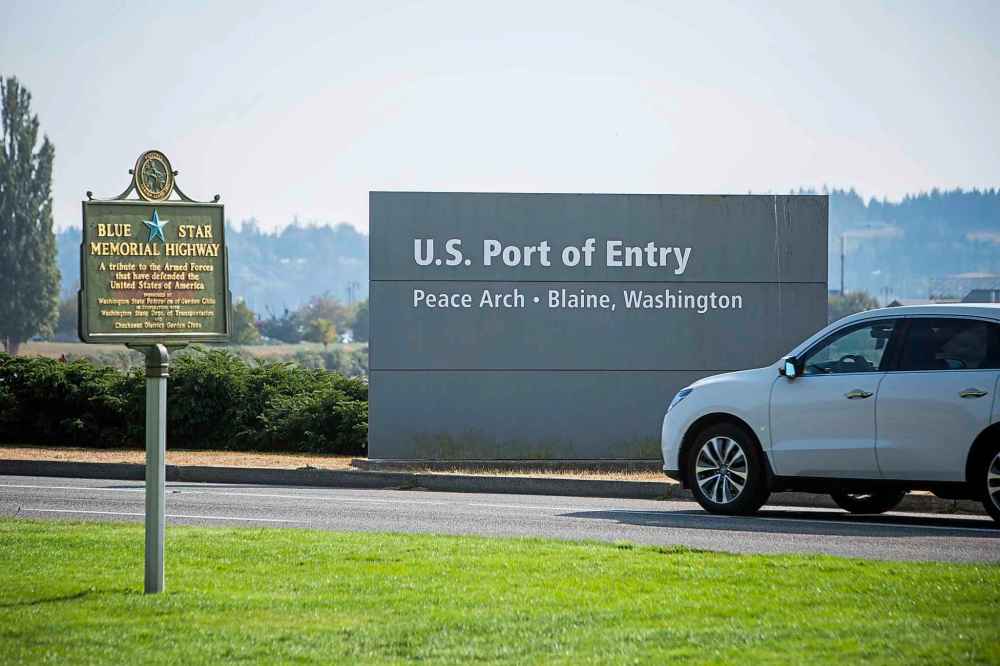
A Canadian who travels south to work in the American cannabis industry, or who invests in U.S.-based cannabis companies, could also be deemed inadmissible by the U.S. government, even if the business or investment in question is legal in states such as Colorado, Washington, Nevada, Oregon, Alaska, Maine or Massachusetts. Border crossings are under federal jurisdiction, and marijuana remains strictly illegal under the U.S. federal government’s Controlled Substances Act.
Technically speaking, says Railton, involvement in Canada’s legal cannabis industry alone shouldn’t be grounds for inadmissibility to the United States.
"I can think of a couple cases where I’ve seen the U.S. border authorities actually ask direct questions about a person’s involvement in the legal industry in Canada, and once it’s deemed that that person’s not involved in the U.S. side, and they’re acting within the law on the Canadian side, their admissibility to the United States has not been impacted."
But even telling a federal border agent that you plan to use cannabis in the U.S. — even in a state where it’s legal — could lead to a ban.
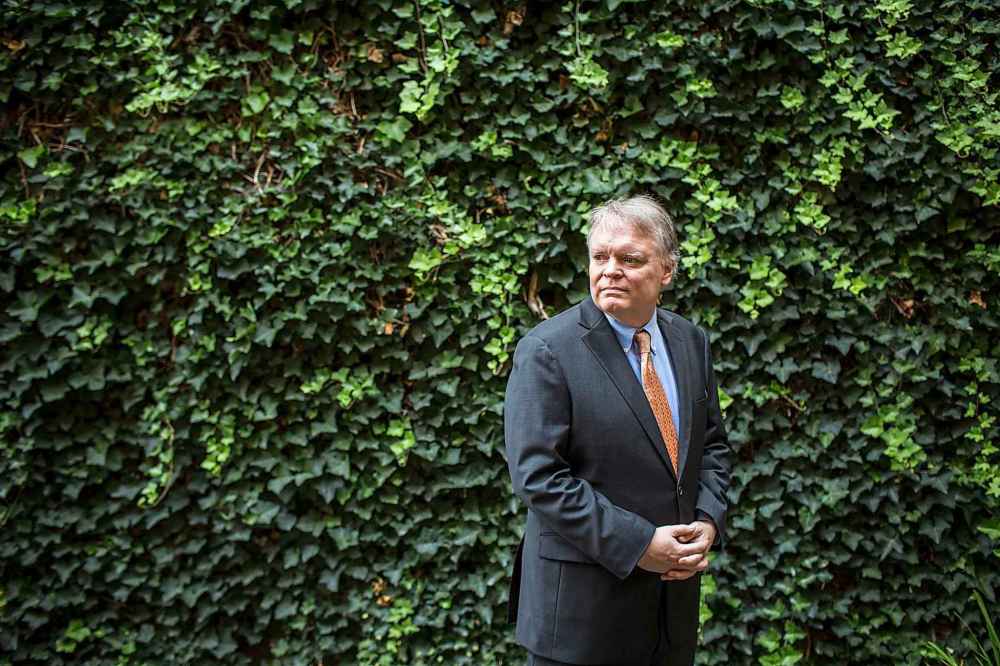
"Basically, if somebody rolls up to the U.S. border and says that they want to come into the United States to purchase marijuana or use marijuana or go on a marijuana tour, perhaps, that would be an illegal purpose for entry," Railton says.
"And so, while they haven’t violated the law, their intention on arrival is to pursue an illegal activity."
U.S. border agents also have the power to bar foreigners on health-related grounds by deeming them a suspected "drug abuser" or "drug addict." After that, getting a waiver to re-enter the U.S. requires passing an examination from a U.S. government-approved panel physician, which might include some tough questions about the subject’s drug use.
Finally, if a U.S. customs official catches a foreigner lying about their cannabis use — or anything else, for that matter — an entrance ban is in the cards.
One kind of Canadian doesn’t need to fear questions about marijuana at the border, though: Canadian citizens who hold dual citizenship with the United States.
"Anybody who’s a citizen of the United States is always entitled to entry, even if they’re guilty of the most heinous of crimes," says Railton.
It’s hard to quantify exactly how often U.S. border guards question Canadians about cannabis, but Railton says various clues might inspire them to ask.
What about medical marijuana at the U.S. border?
Canadians who are legally registered with Health Canada to use cannabis for medical purposes can’t legally bring their medication across the Canada-U.S. border, even if they’re headed to one of the growing number of U.S. states that have legalized medical marijuana.
“They don’t bar people who are using it under a federal medical approved licence,” explains immigration lawyer Len Saunders.
Canadians who are legally registered with Health Canada to use cannabis for medical purposes can’t legally bring their medication across the Canada-U.S. border, even if they’re headed to one of the growing number of U.S. states that have legalized medical marijuana.
“They don’t bar people who are using it under a federal medical approved licence,” explains immigration lawyer Len Saunders.
But, he adds, if U.S. border officers find out that a Canadian is a medical cannabis user, they’ll ask whether they ever used cannabis before receiving medical authorization — just like they did to his client Blaine Graham.
“And you know what most people say? ‘Yes, I did.’ So that means they’re inadmissible, because they used it before they were granted the licence.”
Saunders says medical cannabis users could bring official proper documentation to prove they’re licensed, “but the thing is, they’ll just go around that and find another grounds to deny them.”
“I’ve never had somebody say to me, ‘I went to the border, I told them I used it legally under a medical marijuana licence, and they said I was good to go.’ I’ve never had that happen, because people either lie, and don’t tell them, or if they tell them — look what happened to Blaine (Graham).”
Saunders has some blunt advice for legal Canadian medical cannabis users who are trying to cross the U.S. border.
“Don’t admit to anything, whether you do it legally or not…. If they want to deny you entry, they’ll find ways of doing it, period.”
"Sometimes it comes up in the context of, they find marijuana in the car, sometimes it comes up in the context of, they’re searching phones or computers for some other reason, and there’s something that suggests marijuana," he says.
"Sometimes it’s as simple as, the person seeking admission has a sticker on the car which suggests that they use marijuana."
Railton believes U.S. border officials ask Canadians about marijuana at land border crossings more often than in airports, although that happens too.
"There seems to be more cues, I think, when somebody’s driving a car into the United States," he says. "There’s more to inspect, actually."
Overall, lawyer Len Saunders believes the odds of a Canadian traveller being interrogated about marijuana at the U.S. border are "remote."
"If they’re asking every single person, the lines would back up to the North Pole," he says. "But it’s enough."
•••
Ralph Goodale is responsible for Canada’s borders, and says his office has held ongoing talks with its U.S. counterparts about the issue of cannabis at the border. In August, he told reporters the two countries hadn’t reached any kind of formal deal on what will happen after legalization on Oct. 17.

"The United States will determine their own rules for entering their country, just as we determine our own rules for people entering Canada," Goodale said after speaking to the annual conference of the Canadian Association of Police Governance in Winnipeg earlier this month.
"Each country has a sovereign right to establish their own rules. We expect Canadians to be treated honourably and fairly in crossing the border as they always have been."
Goodale’s press secretary echoed that sentiment in a written statement.
"Canadians who wish to enter the United States or any other country have to adhere to its laws…. Officials from the United States have said that they do not plan on changing their questions at primary inspection after cannabis is legalized in Canada. However, if a traveller gives them reason to be suspicious, their officers may ask further questions."
Public Safety Canada is focusing its cannabis-related messaging on a much more straightforward issue, reminding Canadians not to bring cannabis in either direction across the Canada-U.S. border after legalization.
A new animated video published by the Canada Border Services Agency uses the tagline, "Keep it legal. Don’t bring it in. Don’t take it out." A CBSA spokeswoman says Transport Canada "is working with stakeholders to post signage advising travellers that it is illegal to cross international borders with cannabis."
"Signs will be installed at airports, ferry and cruise terminals, and railway stations at exit points from Canada. With respect to land border crossings, Transport Canada is working with provinces and territories to install road signs near the border."
Liberal Sen. Mobina Jaffer doesn’t think that’s enough. She represents British Columbia, and her constituents have told her they’re increasingly being asked about cannabis when they try to enter the U.S.
"My concern is that people are going about their business, not knowing that if they have ever used cannabis they can be stopped forever from going into the U.S.," she says.
"And I’m concerned that that there isn’t a massive — and I mean massive — campaign on our TV" to raise awareness of the issue.
Like Saunders, Jaffer worries when Canadian government officials tell travellers to always be completely honest at the U.S. border.
"I’m not asking anybody to lie," she explains. "But I’m just wanting people to know that telling the truth can cause you consequences. You don’t have to respond — people don’t know that’s an option."
"And I’m not talking about people who are transporting even a little bit of cannabis across the border, or who just had some. I’m really speaking about people who have, in their life, smoked it, or smoked it a few months before they even travelled. Those kinds of people, I’m more concerned about."
•••
Almost 45 per cent of Canadians aged 15 and older have used cannabis in their lives, according to a 2015 government survey. In theory, all of those Canadians could be found inadmissible into the U.S. under current policies.
But with legalization less than two months away, the border impasse over Canadians’ past cannabis use raises an important question: will U.S. border authorities start changing their approach to marijuana after the drug become legal for Canadian adults?
The answer is no, according to a spokeswoman for U.S. Customs and Border Protection.
"Policies will not change," she wrote in a statement.
"Requirements for international travellers wishing to enter the United States are governed by and conducted in accordance with U.S. federal law, which supersedes state laws. Although medical and recreational marijuana may be legal in some U.S. states and Canada, the sale, possession, production and distribution of marijuana or the facilitation of the aforementioned remain illegal under U.S. federal law. Consequently, crossing the border or arriving at a U.S. port of entry in violation of this law may result in denied admission, seizure, fines and apprehension."

As for Canadians who admit to past marijuana use, the spokeswoman was clear.
"Aliens must overcome all grounds of inadmissibility, including admissions of past violations of controlled substance law. Possession and/or admission to the use of marijuana by an alien may result in the refusal of admission."
Immigration attorney Scott Railton believes Canadians who admit to having legally used marijuana after legalization comes into force shouldn’t be found inadmissible under U.S. law.
But Canada’s federal legalization law comes with some strict legal limits, and Railton points out that Canadians who get caught breaking the new cannabis laws — for example, by growing an illegal number of plants — might continue to face trouble at the border.
"There’s also the possibility, still, that convictions for past violations of marijuana laws… that predate the legalization would create a basis for inadmissibility, as well as even an admission to having violated the law before cannabis was legalized," says Railton.
"I don’t think they’ll necessarily be digging for that at the border, but on paper it is a basis for inadmissibility."
Saunders doesn’t expect a post-legalization increase in the number of Canadians who are barred for admitting to past cannabis use, but he does worry that Canadians might get in trouble at the border if they accidentally leave legally-purchased marijuana in their vehicles.
U.S. customs officers are "not going to seize it and let the Canadian enter," says Saunders.

Even more unnerving is speculation that U.S. border authorities could search financial databases to see whether a Canadian traveller has ever purchased legal marijuana using a credit card.
"Because, you go down to the BC Cannabis Store, and you purchase, using your credit card, a couple joints," says Kyla Lee, a Vancouver attorney who specializes in impaired driving cases.
"Now, your credit card tracks you as somebody who buys cannabis. And it shows up on your statement as cannabis. And you’ve made a purchase of what the U.S. considers a serious narcotic."
Saunders thinks that scenario is unlikely, but not impossible.
"However, I have online banking on my phone," he says. "All it takes is for them to go on your phone and check your bank purchases. And if you bought marijuana… it’s going to show up."
•••
Saunders doubts the U.S. government will change its severe approach to past cannabis use at the border unless it suffers some kind of major political embarrassment, "like if Trudeau ever gets denied entry." (The prime minister has admitted to using cannabis.)
"You need some more high-profile cases to get the American public to realize what a problem it is," he says.
"Most Americans don’t care about this, because it’s just individuals not being able to enter the United States. Canadians find it more troubling."
Saunders’ perspective doesn’t hold much promise for regular Canadians such as Blaine Graham. When he deals with U.S. border officials now, he feels the strain of post-traumatic stress.
"It’s just been a horrible experience," says Graham. "When I go to the border, my heart starts beating, I start sweating. I’m just nervous. What are they going to ask? What are they going to do? Are they going to go through my phone?"
Graham thinks the officials who zealously guard America’s borders from cannabis users should re-evaluate their priorities.
"They could be spending more time on people that have a criminal record, and vetting them. Like, why are you trying so hard to vet me? I have a (work) visa, I’m trying to come into your country to create more jobs and work for your local people," he says.
"And it’s just… I don’t know, it just baffles me."
solomon.israel@theleafnews.com
@sol_israel
History
Updated on Friday, August 31, 2018 9:49 AM CDT: An earlier version of this story misidentified the Peace Arch border crossing as a bridge.

